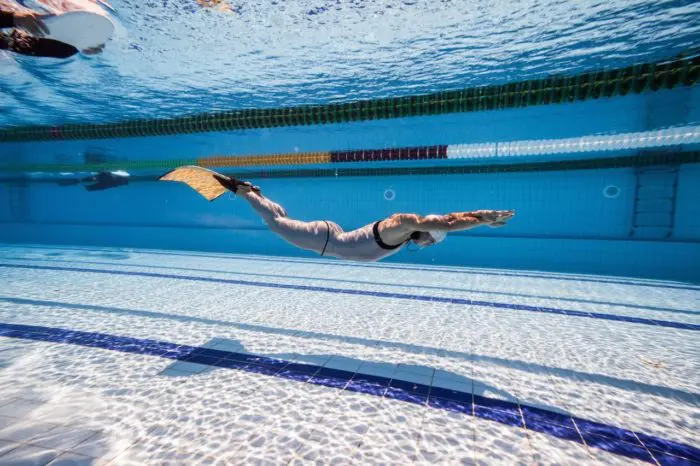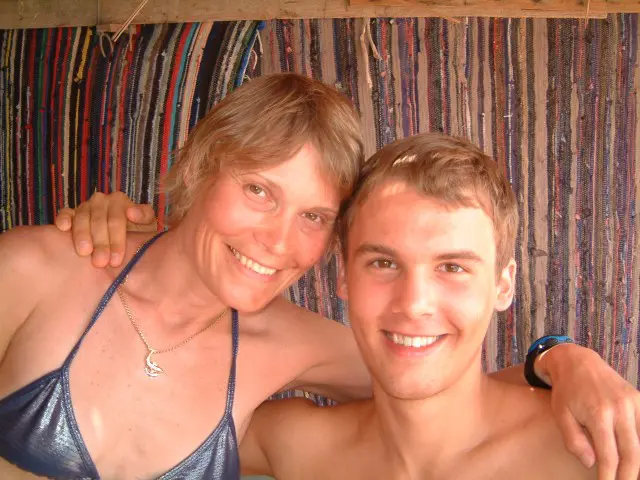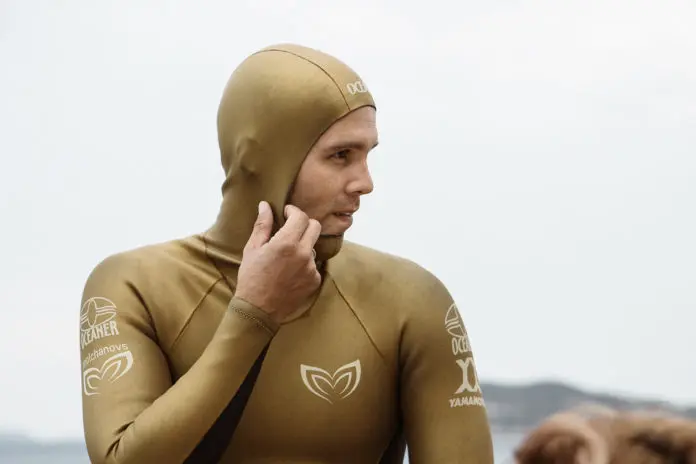Alexey Molchanov is best known as freediving’s deepest man, but he is also an equipment innovator, the developer of a freediving training system, a teacher, and underwater photographer, with a background as a Software Engineer. A competitive swimmer from the age of four, freediving was a natural progression for Alexey, such that in his first year as a freediver – at the age of 17 – he broke a Russian National Record in the pool with a 158m Dynamic (DYN) in 2004. His first World Record came four years later, also in the pool, this time reaching 250m (DYN).

In another four years on, Alexey would break a depth world record in the Constant Weight discipline (CWT) with a dive to 125m, and then took it to 126m later in the same year. A year later, in 2013, he extended the record to 128m. Firmly established as the strongest man with a monofin in the depth disciplines, Molchanov would three years later further the depth another meter to 129m in 2016, where the record currently stands.
RELATED: Freediving Disciplines Explained
While Alexey is the best at Constant Weight (CWT), he is also joint World Record holder of the Free Immersion (FIM) discipline, with William Trubridge, who broke the record in 2016 and was matched by Molchanov in 2017.

Alexey would train and compete alongside his mother – Natalia Molchanova, widely recognized as the most accomplished freediver in history – and he now continues to further the training program that Natalia had been developing to worldwide acclaim.
RELATED: Profile: Natalia Molchanova
As well as running the Russian Freediving Federation, Alexey is also the developer for the Molchanovs freediving equipment brand, fast becoming a firm favorite amongst top freediving athletes and amateurs alike. Innovative design and focus on the biomechanics of the diver alongside cleverly designed, high-quality gear makes the Molchanovs brand unique in the field of freediving equipment. Most recently, Molchanovs has brought out a new design in carbon bi-fins with custom-made foot pockets to get the most efficiency from the blade.
Alexey has shared with DeeperBlue.com the things that give him ‘simple happiness’ in his life, how he views his achievements, what he eats for breakfast, and more about that 129m World Record dive in Mexico in 2016! Read on to learn more.
DeeperBlue.com: What continues to inspire your freediving?
Alexey Molchanov: I would say the complexity of freediving, how challenging it is, how many different sides of freediving there are. Competitive freediving is something I like a lot, but I also enjoy recreational freediving. If we talk about competitive freediving, I’ve been in the water since I was a kid, a competitive swimmer since I was 4 years old, and even then we were diving a lot for fun, breath-holding, breath-hold competitions in the 1990s when no one really knew much about freediving. It was always part of my everyday activity as a swimmer, and I look at it as something really natural. I don’t really need anything to inspire my freediving, as it’s part of my everyday life. What inspires me to do records is just the ability to do them. I can feel that I have the potential to do the record, and I can naturally do them without mental discomfort. I really like to train and enjoy the process of everyday training, and it’s a part of my daily routine.
DB: Who do you most admire in the freediving world?
AM: Hmm… well, obviously my example for me was always my mum. Now I don’t really look for other examples (laughs), I don’t admire anyone but her. I think my job is the opposite: I should be an example to others. If were to admire something it would be marine mammals, like sea lions and orcas. They’re playful, they’re very good swimmers, graceful in the water; they are a really good example.
DB: What is/are your favorite place/s to freedive?
AM: If we talk about the diversity of species, I really like La Paz in the sea of Cortes. There are lots of marine species, sea lions. I like places that are in some way unique. The Vertical Blue competition in the Bahamas I really like because the blue waters around the island are really beautiful, Deans Blue Hole is amazing. Gili Trawangan, I like the color of the water, the conditions, it’s a bit more remote and it’s a beautiful place. And the Red Sea in Egypt has the best colors and is one of the best seas in the world for me, the reef, the fish, how much life you see there. It’s a really hard question to answer because there are so many beautiful locations!
DB: Can you tell us about any exciting locations that you would you love to freedive?
AM: We are planning to go to Tonga in August to dive with whales and I’m really excited about that. I would like to dive with Orcas in Norway, so that’s on my list too!
DB: What would be your best piece of training advice for beginner/intermediate freedivers?
AM: For a beginner, the best advice is to follow the guidance of an experienced coach or instructor and not to try to progress or waste time finding things on the internet. Find a good instructor. This makes it safe, and it’s important to learn correct techniques from the beginning because it is much harder to relearn than to learn.
DB: Top freediving athletes favor a variety of cross-training methods. What is your preferred form of dry training and why?
AM: I do body weight exercises and stretching, and that’s usually enough for me. I have daily pool or depth training too, so I prioritize them over dry training. I was doing more exercises with weights before, but do not have any problems with strength now he he!
DB: What is your pre-dive preference: breakfast or fasting?
AM: I usually eat. Not for static. But for dynamic or depth, I would have breakfast.
DB: What general nutritional principles do you follow?
AM: I try to have a good variety of food. I don’t try to control and be too strict about what I eat. Of course, I try not to eat unhealthy food like fast food and sweets. I eat a variety of foods, like salads, plus meat, fish, good sources of protein. I’m not vegetarian. I eat everything I see! (laughs) I like dairy, I don’t need to avoid wheat as I don’t have allergies, but actually, I don’t really eat bread or pasta, so perhaps that is why I don’t need to avoid gluten. I try to have a healthy amount of fat in my diet, like full-fat milk and cheese. I eat a lot of dairy actually. My breakfast is usually cottage cheese, with pine nuts or cedar tree nuts (similar to pine nuts), and honey. I like honey a lot. And buckwheat, a very traditional and healthy breakfast in Russia. I eat a lot when I train a lot! Deep divers need to eat a lot! It’s important for recovery.
DB: What important life-lessons has freediving given you?
AM: Well, what freediving definitely teaches you is to be more stress-resistant. I think that is the best lesson. Because when you hold your breath you become more philosophical about other hard things in life.
We have a little study in Russia which is on-going – part of a Ph.D. thesis at Moscow State University, which questions how freedivers feel about breathing. Freedivers have a different perception of breathing compared with that of a non-freediver. Freedivers perceive breathing as something enjoyable, and light and positive; but for many people, it isn’t like that. For non-freedivers or people with postural problems, breathing problems, asthma, they would perceive breathing as heavy, not fluent, unpleasant. So I think freediving, in general, is a very positive thing, which, if it is taught well, can really be a life-changing experience which shows you how you can enjoy breathing, and it benefits your overall health in a good way. Breathing helps your mood, health state… to summarize; freediving helps you to have a positive perception of breathing.
DB: Where do you see yourself in 5-10 years?
AM: In 10 years I still see myself competing for sure because I’ll be 40 and that is relatively young. If you look at the example of my mum, at 50 you can still perform at your personal best level and still progress. So I don’t set any timeframe for my competitive career. I don’t push my competitive edge, I progress slowly, I don’t push my records or do them on the limit, so I still have good reserves for my competitive career. And regarding equipment and the education/training system we develop – that my mum was developing for 15 years – and that I continue to develop, that’s my plan: to keep developing our training system and to make it well known around the world.
The equipment is my passion. I like to develop equipment, so I will continue to keep growing the Molchanovs brand. Which is getting so much easier and faster now with help from so many awesome and talented people on board. The reason why I love to develop and test gear is that, in the first place, I develop it for myself, to compete, which is why people love it. I’m pretty lucky that my work is in line with my passion! So my plans are pretty easy! Keep competing, keep developing the education system and keep making the best equipment for freediving.
DB: Can you describe your most memorable or significant dive?
AM: I think one of the hardest dives I did – and it’s memorable because of that – was the 129m (CWT) world record I did in Baja, Mexico. It was hard, the conditions were not perfect on that day, the dive was in open sea, in the Sea of Cortes, there was breeze, small waves, but the rope and platform started to move, and if you see the video of the dive, there was a good 5-10% angle on the rope, which for a world record it’s a bit of a problem! So, on the video, when I surface you can see I’m white, my lips are white! But I was clean. I only chose to dive because I felt strong during my training, and my physical shape at that moment was great. The dive was almost canceled because of the conditions, So that was one of the most memorable and hard dives. But there are many other memorable fun dives with sea lions, and with bull sharks, and moments outside of competitive diving, or in the Cenotes in Mexico! I have dozens of beautiful, memorable dives with interactions with animals.
DB: Which of your achievements are you most proud of, and why?
AM: Ah, well, I cannot really say that I am really proud of myself for the sporting achievements only, because I really enjoy doing other things besides that. It’s an interesting question because I do enjoy doing the world records to give an example to young people and new freedivers, but doing the records doesn’t necessarily make me super happy for myself. It’s interesting because it makes me happier to see how it [the record] makes other people happy than me for myself! I’m proud of developing freediving in Russia and promoting it in the world. The general organization and administrative functions that I perform for the Federation in Russia are not important in terms of money, but they are really rewarding in terms of seeing how freediving grows, helping to organize the National Championships, financing and putting together a team for the World Championships. This type of activity I enjoy and I’m proud of being part of the Freediving Federation in Russia and the development of freediving in the world.
In terms of simple things, I can say I’m really proud of the equipment I develop: you put a year of your life into testing first generation fins, maybe 5 years into second or third generation, and you can see how this changes the world of freediving as well. Molchanovs new gear changes finning techniques that freedivers around the world start to learn. In the older days fins were stiffer and not working well, and I get a lot of satisfaction seeing I’ve developed something that is softer, enjoyable to use but more efficient. Holding it in my hands and using it in the water and seeing the progression of equipment in the freediving world, that is a simple happiness for me. I don’t just have one role. It’s like fifty shades of happiness!!! Organiser, administrator, developer, creator.. it all has its own happiness.
You can find out more about Alexey Molchanov at www.facebook.com/WorldChampionFreediver.

